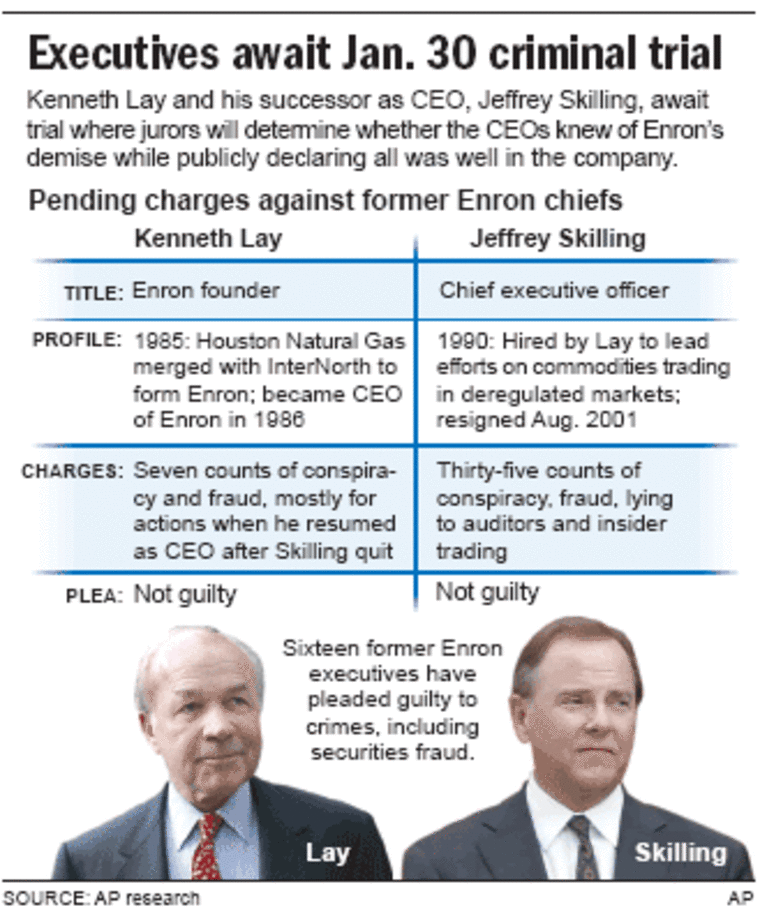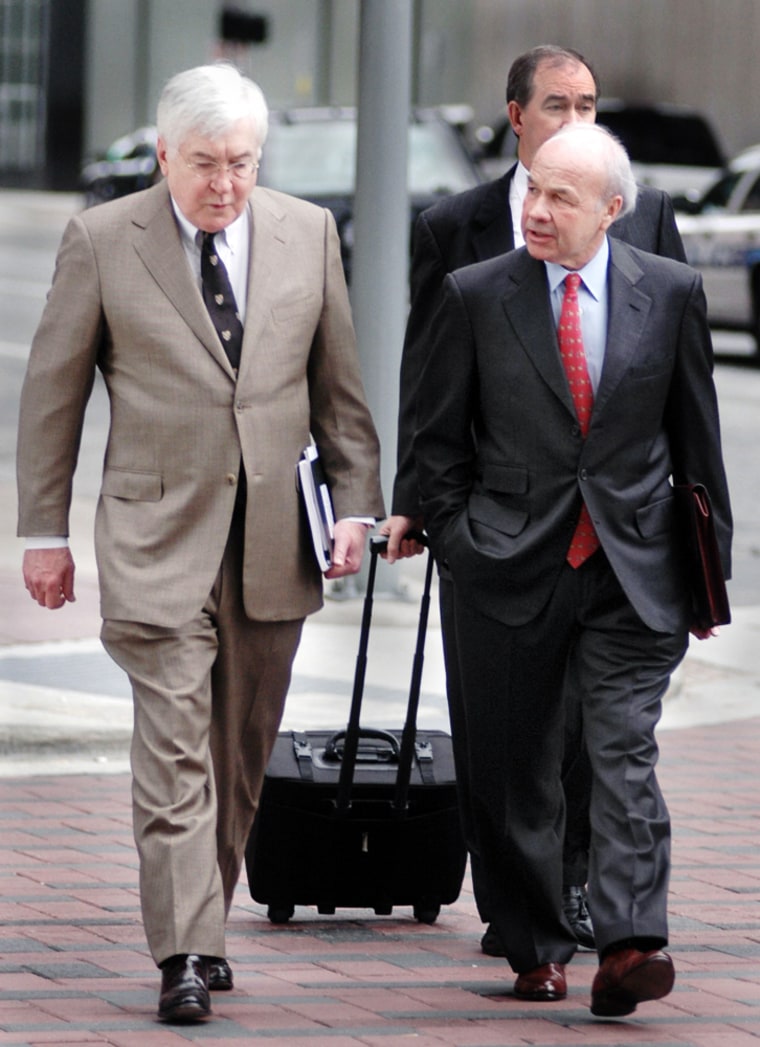At its heart, the biggest criminal case to emerge from the largest corporate scandal of recent years comes down to whether Enron Corp.’s top two former executives lied.
Enron founder Kenneth Lay and his hand-picked successor as CEO, Jeffrey Skilling, go on trial Jan. 30 as alleged purveyors of deceit more than four years after the company became synonymous with corporate greed and wrongdoing.
Before its 2001 fall, Enron ranked seventh on the Fortune 500, posting billions in revenue and oozing prestige, money and swagger. Lay and Skilling were the embodiment of it all. But when relentless investigations exposed inflated profits and billions in debt hidden in off-the-books financial structures, investors fled and the company crumbled.
The question for a dozen jurors to answer is whether Lay and Skilling knew of Enron’s rot when they repeatedly declared publicly that all was well or would improve.
“The crimes alleged at Enron were not the acts of a few greedy senior executives, but truly was an indictment of almost the entire corporate culture,” said Robert Mintz, a former federal prosecutor who has followed the Enron saga since the energy company went bankrupt in December 2001.
The government alleges Lay and Skilling conspired with minions to mislead investors, analysts, auditors and employees through false or sanitized financial statements, empty hype and shady accounting maneuvers in finance, broadband, trading and retail energy units.
The indictment alleges Skilling knew Enron’s business units turned to accounting tricks to please Wall Street while he pocketed millions from sales of inflated shares.
Prosecutors allege further that Lay perpetuated the ruse after he resumed as CEO upon Skilling’s abrupt August 2001 resignation.
Skilling faces 35 counts of conspiracy, fraud, lying to auditors and insider trading. Lay faces seven counts of conspiracy and fraud, focusing mostly on his actions after Skilling quit. Both have pleaded not guilty, and have said repeatedly they were not involved in any wrongdoing.
The case, expected to last about four months, could be an endurance test for jurors and a challenge for prosecutors to keep it simple, said Ross Albert, a former federal prosecutor.

“If the government cannot explain what happened at Enron and why it was wrong in terms a jury of 12 lay persons can understand, then the government will likely fail to obtain convictions,” Albert said.
But Samuel Buell, a former federal prosecutor with the Justice Department’s Enron Task Force who now teaches at the University of Texas School of Law, said the complex financial maneuvers spread across business units lead to the same conspiracy.
“Once you put all these transactions together and you understand how they work together to further an objective — that was designed to present a picture of the company that did not match reality — it’s not that complicated,” Buell said.
In a speech last month to Houston business and academic leaders, Lay indicated that the defense teams intend to try to exonerate the company along with their clients, saying Enron wasn’t rife with corruption and the deals, partnerships and financial structures outlined in the indictment were legitimate.
Such activities include holding portions of profits in reserves and off-the-books structures and partnerships that carry debt or assets.
Lay said in his speech that the government’s investigation targets normal daily business activities common in publicly traded companies across the country.
“In virtually every other situation, if there were concerns that any of these business activities were not being done appropriately, these concerns would be addressed by a regulatory agency, like the SEC, or as a civil matter in the courts. However, in this case, the Enron Task Force is attempting to criminalize these very same business activities,” Lay said.
Gary Brown, former special counsel for the Senate Committee on Governmental Affairs during its investigation of Enron’s collapse, said such an approach by the defense could be risky.
Sixteen former Enron executives have pleaded guilty to crimes, including securities fraud, insider trading and conspiracy, Brown noted. They include former chief accounting officer Richard Causey, who was to go to trial alongside Lay and Skilling until he pleaded guilty last month; former chief financial officer Andrew Fastow; and former heads of retail energy, broadband and investor relations.
Four former Merrill Lynch & Co. executives and a former midlevel Enron finance executive are in prison after a jury convicted them of helping push through a loan to Enron disguised as a sale.
And, Merrill Lynch, JP Morgan Chase, Citigroup and the Canadian Imperial Bank of Commerce have paid the SEC nearly $400 million to settle allegations that they helped Enron manipulate financial statements and mislead investors. JP Morgan, Citigroup and CIBC also have paid $6.6 billion to settle similar allegations in a conglomerate of Enron shareholder lawsuits.
However, the government has some bruises.
The U.S. Supreme Court in June overturned the 2002 obstruction of justice conviction of former Enron auditor Arthur Andersen LLP, accused of destroying tons of Enron-related documents to thwart an SEC investigation. The justices unanimously ruled that vague jury instructions proposed by prosecutors allowed jurors to convict without finding criminal intent existed.
Last month, David Duncan, former top Enron auditor for Andersen, withdrew his guilty plea to obstruction without government opposition because he never admitted to consciousness of wrongdoing.
A former in-house Enron accountant tried alongside a colleague and the Merrill Lynch executives was acquitted. And in July a three-month trial of five former Enron broadband executives ended with some acquittals and jurors hung on other charges, so those defendants will be tried in three cases later this year.
Brown said Lay and Skilling could allege overzealous prosecution, but it could backfire.
“It’s fraught with peril because if you lose that one, then you’ve shot your credibility across the board,” he said. “If these guys take the stand, they’d better be very careful and they’d better be sure there’s no smoking gun document. Once your credibility is lost on the jury, it’s over.”
Lay says he will testify. Skilling’s lead trial lawyer, Daniel Petrocelli, won’t say if his client will do the same, though Skilling said at two congressional hearings in early 2002 he resigned believing Enron was healthy.
“Jeff had nothing to hide, and more importantly, he felt an obligation as the former president and CEO to participate in the process and he did,” Petrocelli said. “Just knowing Jeff the way I do, I think he very much wants to testify.”
Eight of the government’s cooperators, including Fastow, are on its most recent witness list of 61 people. Causey isn’t, but he could become a witness during the government’s main case or to rebut the defense case.
Another notable prosecution witness is Sherron Watkins, who warned Lay months before Enron’s fall that Fastow had cooked up fraudulent accounting schemes that could bring down the company.
The combined defense witness list of 199 people includes other government’s cooperators, as well as ex-employees from various Enron business units and friends of the defendants.
Despite the massive news coverage, books and films that emerged from the Enron scandal, the witnesses will tell the story, Buell said.
“The only way to understand it is to hear it from the insiders,” he said.
